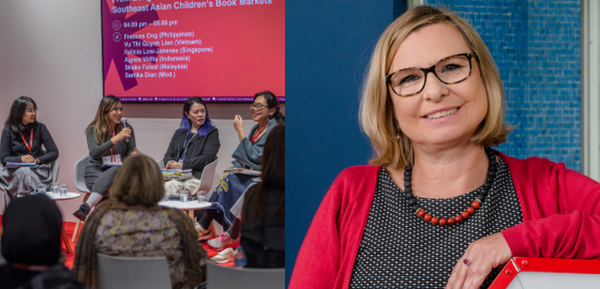From children's books to young adult: How Southeast Asia is providing new impetus

Panel "Explore Southeast Asian Children’s Book Markets" auf der FBM25 (l.), Claudia Kaiser (r.)
© Ingo Hattendorf, Bernd Hartung
Southeast Asia's book scene is rapidly gaining profile – including on the Asia Stage at Frankfurter Buchmesse, where children's books, young adult titles and new voices from the region are attracting increasing attention. In an interview, Claudia Kaiser, Vice President Business Development at Frankfurter Buchmesse, explains the dynamics shaping the market and why so many fresh ideas are coming out of Southeast Asia right now.
When did Asia Stage first start, and what was the idea behind its creation?
Claudia KAiser: The first edition of Asia Stage, in 2018, was called ASEAN FORUM. In 2019, it became ASEAN Stage. Then the pandemic hit, and since 2024 it has been back under the name Asia Stage. The event stage is a collaboration between Frankfurter Buchmesse and the Philippine publishing house REX Education, whose former president is also known as the ‘father of the Philippine publishing industry’. Mr Buhain is also a member of the ASEAN Book Publishers Association, which represents the interests of the ten ASEAN countries at that time. The reason for this at Frankfurter Buchmesse is our interest in making the market in Asia, especially in Southeast Asia, more visible and creating more connections between Southeast Asia and the world.
What makes the Southeast Asian book market special in international comparison – in terms of dynamics, topics or opportunities for cooperation?
Southeast Asia has a population of almost 700 million, and many countries, such as Indonesia, have a young population. So there are great opportunities here. It is a very heterogeneous market, with many different languages in which publications appear. There is a high demand for translations from the West – the markets in Vietnam and Thailand, for example, are very dynamic, while exchange within Southeast Asia is still in its infancy. But there is a lot of movement here too. Frankfurter Buchmesse's focus on Indonesia (Guest of Honour in 2015) and the Philippines (Guest of Honour in 2025), as well as the events on the Asia Stage, are bringing the issues facing these markets to the fore.
It is clear how much highly interesting literature there is. Not all countries have a functioning translation funding system, but here too we are seeing new impetus, for example in Indonesia. The children's book and illustration sector is also very active and has a lot to offer.
Children's books featured prominently in this year's Asia Stage programme at the book fair. How are titles from Southeast Asia received internationally, and what themes are currently shaping them?
Here, licence trading from Southeast Asia to the Western world is still in its infancy, while in Southeast Asia, many licences from the West are being purchased, especially for children's books. The topics vary depending on the country of origin: in Malaysia and Indonesia, religion and values are a theme. In many countries, education is a top priority, so books with educational relevance are important. But there are also lighter topics. As in Germany, the young adult genre is gaining momentum and, as already mentioned, there are great illustrators.
A focus on the Philippines, Guest of Honour at FBM25: What are the distinctive features of the Philippine book market in terms of content and structure? And what opportunities does this present?
The Philippines is strongly influenced by the United States. It is also said to be the most Westernised country in Southeast Asia. The widespread practice of Christianity also contributes to this impression. Many US remainders end up in the Philippines, at very favourable prices, of course. But more and more books are also being published in the national language, Filipino. There are also trends towards publishing in other languages of the country, but this is not (yet) very widespread. Since so much is written in English, many titles are very accessible to the international market. With numerous islands (880 of the approximately 7,000 islands are inhabited) and poor infrastructure, distribution is not well developed, and piracy continues to be a serious issue.
I see opportunities for foreign publishers in licence sales (education, children's books, graphic novels, literature, non-fiction titles). It is also worth taking a look at the scene when it comes to licence purchasing. Children's books, political books – the Philippines has a very strong civil society and stands up for its views. Resilience is a strength in society, and with its resistance against the besiegers of its history, there is much to learn!
